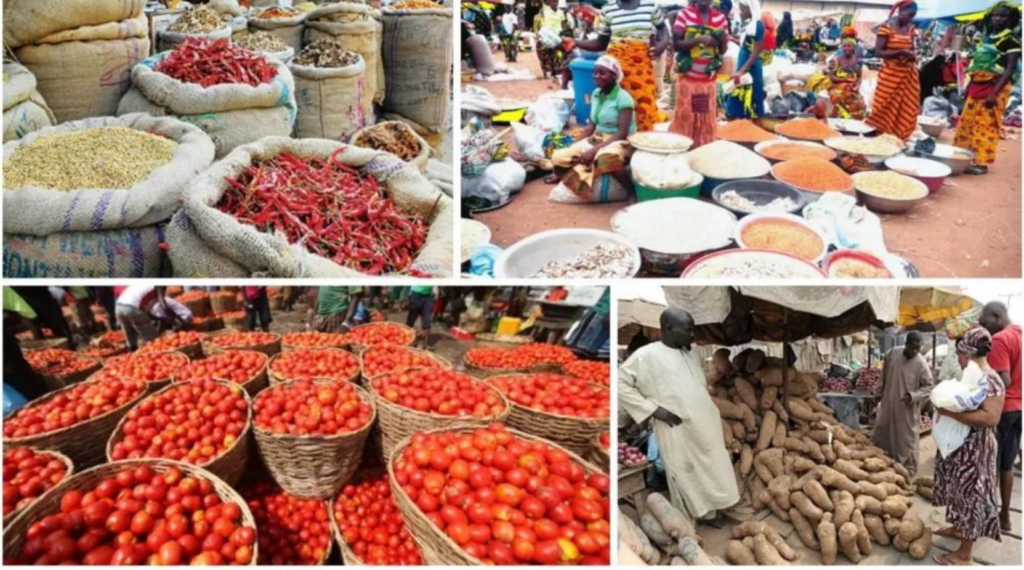🌿 Ruzu Non-Alcoholic Herbal Bitters
Ruzu Non-Alcoholic Herbal Bitters is a natural health supplement specially formulated to:
- ✅ Promote general wellness
- ✅ Detoxify the body
- ✅ Support the treatment of various ailments
Made from a powerful blend of 100% organic and medicinal herbs, Ruzu is completely alcohol-free, making it ideal for:
- 👪 All age groups
- 🌱 Health-conscious individuals
- 🌿 Anyone seeking non-alcoholic herbal remedies
Whether you're looking to boost your vitality, cleanse your system, or support healing the natural way, Ruzu Bitters offers a trusted herbal solution.
The cost of basic foods, particularly rice, is starting to go down a little in a number of markets for residents of the Federal Capital Territory (FCT), Abuja.
According to the report, research from a number of markets shows that although grain prices, especially those of rice, have decreased in comparison to early-year figures, the price of cooking necessities like oil, tomatoes, fish, and meat is still very high.
Many people, however, think that the slight decrease is insufficient to alleviate the financial burden that the majority of households are currently experiencing.
A 50 kg bag of rice at Kubwa Market used to sell for between ₦88,000 and ₦90,000 in January, but depending on the brand, it can now be purchased for as little as ₦75,000.
In a similar vein, a 25 kg bag that used to cost about ₦43,000 is now sold for ₦37,500 or less.
Prices are even more favorable in Nyanya Market, another satellite town, according to a Daily Sun article. Depending on the brand, a 50 kg bag of rice that used to sell for ₦90,000 to ₦93,000 can now be purchased for ₦70,000 to ₦72,000.
Meanwhile, rice prices continue to be comparatively higher in Wuse Market and other city center locations. Although the 25kg version is priced between ₦39,000 and ₦40,000, a 50kg bag now costs between ₦78,000 and ₦80,000, down from ₦92,000 in January.
Components Still Out of Reach
The cost of cooking ingredients is still too high, according to locals, even though grain prices have decreased.
“The reduction is a relief even though it is not significant. “People are suffering,” stated Jabi civil servant Oluchi Benson.
“Because their prices and measurements are better, I travel all the way to Mandala to buy food.”
Grain prices may be lower, but other things have become luxuries, according to Christy Okoye, a Kubwa resident.
“The true problems are fish, oil, and tomatoes. Once regarded as the “protein of the poor,” iced fish is now considered a luxury. Compared to fish, beef is more affordable. In certain places, a kilogram of beef costs more than ₦7,000, and you won’t find any fish for less than ₦1,500, according to Okoye, who was quoted by the Daily Sun.
Read Also: National Urhobo Vanguard Slams Sahara Reporters Over ‘False Allegations’ Against PTI, Demands Apology
A trader in Utako Market named Mama B admitted that although rice prices have decreased, families are now having difficulty finding a variety of basic foods.
“Will we just eat rice? What about our kids’ snacks, oil, or protein? Noodles and biscuits are items that most families have forgotten. “I can now afford to make pancakes and zobo (hibiscus drink) for my kids,” she said.
Maria Ayo, who lives in Dutse Alhaji and has four children, described her coping mechanism. “I stopped buying foodstuffs in small quantities,” she stated. My family has managed better since I started using the contribution method. But fish, yams, meat, and eggs are still too costly. To improve the standard of living for the typical Nigerian, the government must intervene.
Traders Assign Slower Sales to Contributions from Rice
A vendor in Wuse Market named Mallam Aliyu expressed dissatisfaction over the decline in demand for rice since the Christmas season, blaming it on the common practice of rice contribution groups, in which families pool money to purchase large amounts at the end of the year.
“Many families are still eating from what they got during last year’s contribution,” Aliyu said. As a result, sales have decreased.
Abuja residents maintain that the high cost of cooking necessities and protein sources still makes daily survival difficult, despite the slow decline in rice prices providing some hope.
According to reports, the general consensus is still that most families will still find it difficult to feed themselves adequately until there is a more widespread decrease in the cost of all necessary food items, regardless of what the statistics indicate.
















